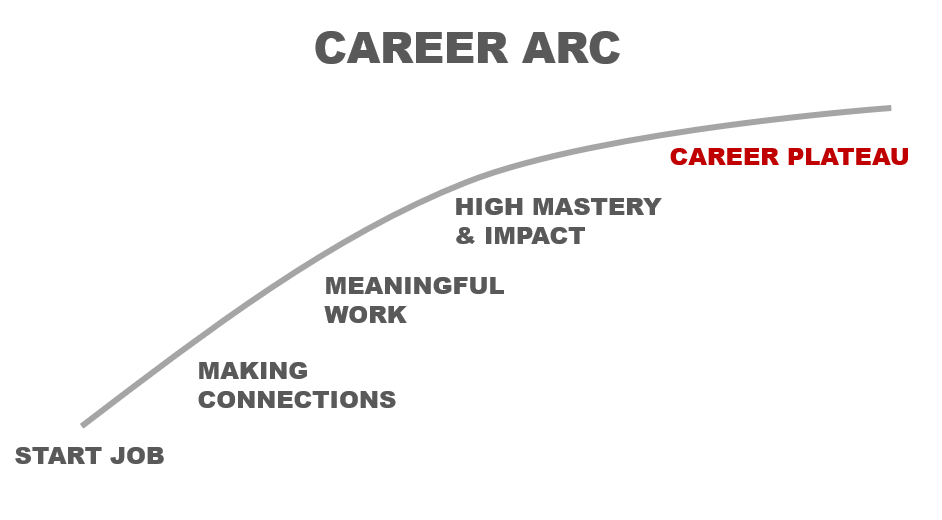There’s all of the expected reasons to leave a job – a bad work environment, lackluster boss, salary, you’re not challenged, etc.
But there’s three other considerations that aren’t often talked about…
#1: Remember the 7 Year Framework
Don’t stay at a job for more than 7 years. Once you’re at a company for more than 7 years it makes your skills less transferable to other industries and companies. Your knowledge of in-house processes, tools, and your company’s inner workings inherently make those skills less helpful in new places. This becomes more exasperated when wanting to switch company sizes, for example going from a large company to a startup.
The average person earns 10% more when switching jobs, compared to the average internal pay raise of 2%. In our careers we have experienced this. In our first jobs we both received a nice raise after the first 1-2 years, but that amount was far less than the pay bump we got taking new positions at our second companies.
If you love your company, then that’s great. Many people have built great careers at the same companies over decades of service. However, that seems to be a more common theme among prior generations, and the new data shows that switching every 7 years (or less) tends to pay off in the long run. There are of course exceptions, such as at high growth companies or if you’re in a leadership development program, but generally you should be aware that after 7 years it puts you in a tougher spot to change.
#2: Watch Out for Career Plateaus
In my latest job I had done it all; developed amazing products, built a team, helped take the company public, and was on the leadership team. Life couldn’t have been better. But then the company stopped doing as well financially, ultimately leading to the point where I had to lay off a portion of my team. I had a fantastic run and learned a ton, and when another opportunity came up I decided to take it.
Let’s plot this on an arc.

Most companies and jobs have these arcs. When you start a job you begin to progress by making connections and learning the ropes. Eventually you find yourself mastering your work and making a large (sometimes enormous) impact. You’re well-respected in the organization and often find yourself in leadership positions. But then you hit what I call the “career plateau”. This is when you realize that you’re not necessarily making as many new connections, learning new things, or being grown/stretched as you previously had. In short, you’ve stopped growing.
The danger of these career plateaus is that you’re comfortable. Things are going well. And that is what makes this stage of a career arc a potential trap.
Staying for subsequent years is usually worse for you AND the company – worse for you since you’re becoming entrenched in that company’s processes, politics, and category; and worse for the company since you’ll have less new ideas and connections. Most of us will just naturally hit a level of mastery where there’s diminishing returns in staying subsequent years. So read the tea leaves early! When progression is flatlining or down, it might be time to start looking.
#3: Avoid Career Regrets
The second most common human emotion, after love, is regret. We all have regrets. We should have applied to a different college, met our spouse earlier, or not eaten that dessert last night. Career regret can be one of the most oppressive, though.
About 6 in 10 American want to start their own companies, and unfortunately only about 1 in 10 ever do. I talk with so many people who want to teach at a university one day (full disclosure: I do, that’s why they tell me and ask how I do it).
But here’s the trick – rather than just wait your whole life to start doing something, you might as well start now. In the words of Nike, “Just Do It”. Even writing this newsletter is a dream that is being realized, and despite both of us having very full plates we’re just doing it. I’m writing this at 11:30pm on a Friday night and am so much happier than if I were watching television or asleep!
You don’t want to end your life wondering “what if” with starting, switching, or enriching your career.
Final Thoughts
Your career shouldn’t be defined by anybody but yourself. You should regularly evaluate your happiness and explore what else is out there (including starting your own business!). An intentional career can be far more rewarding and help avoid being in a situation that makes you less hirable.


